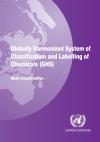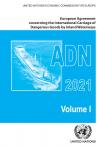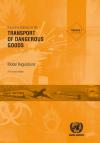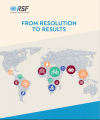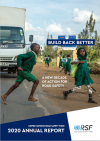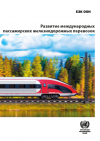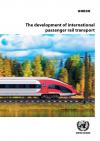Publications
Displaying Results 21 - 40 of 161
- English
The electronic version of GHS Rev.9, available for free for consultation purposes is available here.
Printed versions and electronic editable versions are available for sale at the United Nations Publications section at:
- English
From this page it is possible to view and download the text of the annexed regulations to the ADN as applicable from 1 January 2021 (ADN 2021) in PDF format. The electronic version of the publication is made available for information purposes only. To comply with the requirements of ADN, refer to the official UN official publication on paper.
- English
These recommendations have been developed in the light of technical progress, the advent of new substances and materials, the exigencies of modern transport systems and, above all, the requirement to ensure the safety of people, property and the environment. They are addressed to governments and international organisations concerned with the regulation of the transport of dangerous goods. The
- English
UNRSF is playing a catalytic role in transforming investments for road safety and changing world views to understand how road safety transcends many other SDGs.
In West Africa, 15 countries received support which ultimately resulted in the celebrated adoption of a single environmental used car standard with embedded important road safety requirements.
In Brazil, the road traffic rule enforcement
- Pусский
Международные железнодорожные пассажирские перевозки имеют фундаментальное значение для перемещения людей через границы в регионе ЕЭК. Их центральная роль была подчеркнута в резолюции № 264 Комитета по внутреннему транспорту. Пандемия COVID-19, помимо негативных экономических последствий, которые еще предстоит преодолеть, дает возможность пересмотреть роль железнодорожного транспорта в регионе
- English
International rail passenger transport is of fundamental importance to the movement of people across borders in the ECE region. Its central role was highlighted in Inland Transport Committee Resolution No. 264. The COVID-19 pandemic offers, beyond its negative economic impacts that remain to be recovered from, the opportunity to reconsider the role of rail transport in the ECE region and further
- English
While the second half of 2020 was marked by the warranted fight against the COVID-19 pandemic which continued to change the face of the world, our ambitions for a better global road safety were not scaled back. COVID-19 has taught us to move away from the “silo mentality” and instead align development goals with each other - resulting in higher impact policies and programs.
- English
The UN Road Safety Fund was established in 2018 as a UN multi-partner trust fund pursuant to the General Assembly resolution 70/260 and with the support of the UN Secretary-General. It aims to help low- and middle-income countries put in place an effective national Safety System to substantially
- English
Updated Guidelines on the use of the UNRSF brand and logo
- Français
L’ADR, fait à Genève le 30 septembre 1957 sous l'égide de la Commission économique des Nations Unies pour l'Europe, est entré en vigueur le 29 janvier 1968.
Cet Accord est destiné à accroître la sécurité du transport international de marchandises dangereuses par route. Ses annexes A et B imposent les conditions dans lesquelles les marchandises dangereuses, lorsqu'elles ne sont pas interdites,
- English
Adopted on 30 September 1957 in Geneva under the auspices of the United Nations Economic Commission for Europe (UNECE), the ADR entered into force on 29 January 1968.
This authoritative Agreement is intended to increase the safety of international transport of dangerous goods by road. Its Annexes A and B contain the technical requirements for road transport, i.e. the conditions under which
- English
The UNRSF launches the second issue of its newsletter at a time when the world continues to face unprecedented change and disruptions due to the Covid-19 pandemic. However, the momentum gained with the 3rd Global Ministerial Conference on Road Safety in February 2020 where the Stockholm Declaration was launched with an ambitious target to reduce road deaths and injuries by 50% by 2030 must not
- English
The UN Road Safety Fund’s (UNRSF) secretariat seeks additional financial support from private and public sector donors where the Fund’s mission and donor priorities are aligned. Read more in the UNRSF donor brochure to consider becoming a donor.
Contact the UNRSF secretariat for more information at unrsf_secretariat
- English
Organizations around the world are quickly adapting their programme and project activities to respond to the COVID-19 pandemic and its consequences. The UN Road Safety Fund is committed to the principles of adaptive programming, partnerships, and relevance. The operationalization of these principles is even more critical during this unparalleled time. This flyer provides tools and tips for
- English
The UNRSF 2019 Annual Report is now available. Established two years ago as an innovative United Nations pooled fund, the Annual Report showcases the first concrete results of the UNRSF and thus demonstrates its potential to meet its ambition to substantially reduce death and injuries from road crashes in low and middle-income countries where 93% of the world fatalities occur.
- English
The April 2020 marks the second anniversary of the launch of the United Nations Road Safety Fund (UNRSF). The Fund is now financing 15 projects in 20 low- and middle-income countries to substantially reduce death and injuries from road crashes and to reduce economic losses resulting from these crashes.
- English
As part of the ongoing activities of the Working Party on Rail Transport (SC.2) a workshop titled “Making rail freight more competitive: The coordinated development of the rail network with a focus on how to work together at the government and sectoral levels on the EATL” was held at the seventy-third session of the Working Party.Over 60 participants from national administrations,


